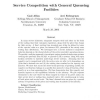Free Online Productivity Tools
i2Speak
i2Symbol
i2OCR
iTex2Img
iWeb2Print
iWeb2Shot
i2Type
iPdf2Split
iPdf2Merge
i2Bopomofo
i2Arabic
i2Style
i2Image
i2PDF
iLatex2Rtf
Sci2ools
112
click to vote
IOR
2008
2008
Service Competition with General Queueing Facilities
In many service industries, companies compete with each other on the basis of the waiting time their customers experience, along with the price they charge for their service. A firm's waiting time standard may either be defined in terms of the expected value or a given, for instance 95%, percentile of the steady state waiting time distribution. We investigate how a service industry's competitive behavior depends on the characteristics of the service providers' queueing systems. We provide a unifying approach to investigate various standard single stage systems covering the spectrum from M/M/1 to general G/GI/s systems, along with open Jackson networks to represent multi-stage service systems. Assuming that the capacity cost is proportional with the service rates we refer to its dependence on (i)the firm's demand rate and (ii) the waiting time standard as the capacity cost function. We show that across the above broad spectrum of queueing models, the capacity cost f...
Demand Rates | IOR 2008 | Systems | Time Standards |
Related Content
| Added | 12 Dec 2010 |
| Updated | 12 Dec 2010 |
| Type | Journal |
| Year | 2008 |
| Where | IOR |
| Authors | Gad Allon, Awi Federgruen |
Comments (0)

